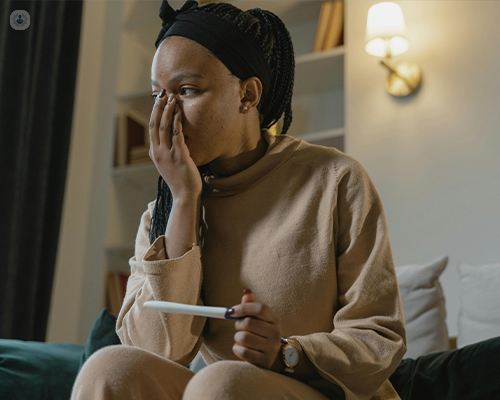Menopause support
Menopause support
Menopause is when the menstrual cycle stops due to a change in hormones, and the ovarian follicles stop functioning. Among other bodily changes that occur during menopause, one key aspect is the loss of fertility.
This is an expected, natural process that is part of ageing and all menstruating people will go through it in their lives, typically around the age of 45 to 55. However, some women will undergo menopause earlier than 45 years old, known as early menopause; menopause before the age of 40 is sometimes called premature menopause.

The menopausal process can take around 10 years and will start with irregular, lightening periods in what is called perimenopause. At this stage, it becomes very difficult to become pregnant, but not entirely impossible. By the end of menopause, when the menstrual period has not happened for 12 consecutive months, it will not be possible to become pregnant naturally.
Those who go through early or premature menopause may worry about their opportunity to become a parent, but fertility treatments like in-vitro fertilisation (IVF) can help.
How does menopause inhibit fertility?
During menopause, the ovaries no longer release an egg into the uterus regularly, and as the uterine lining no longer needs to be shed and regrown, the menstruation will become more infrequent until, eventually, it will stop forever. Without the menstrual cycle, conception is not feasible.
What are the signs of menopause?
Aside from a menstrual period that has stopped completely or that is beginning to become more infrequent and lighter, other symptoms of menopause include:
- Hot flashes
- Night sweats and difficulty sleeping
- Lower libido
- Low mood, depression, or anxiety
- Vaginal dryness
What can cause early menopause?
Early menopause can be caused by ovarian dysfunction or insufficiency, where they produce less oestrogen than they should and no longer release eggs on schedule. This is called premature ovarian insufficiency (POI).
This can happen due to:
- Chromosomal conditions
- Autoimmune conditions, like multiple sclerosis or lupus
- Cancer of the ovaries, and radiotherapy used to treat it
- Oophorectomy (ovary removal surgery) or hysterectomy
- Endometriosis, where endometrium tissue grows on and obstructs the ovaries and fallopian tubes
When should I see a fertility specialist?
Women who are exhibiting menopausal symptoms before the age of 45 or who have been unsuccessfully trying to conceive for over a year should consult with a fertility specialist as they may be experiencing early menopause.
A fertility specialist will be able to investigate why you are undergoing menopause early, assess your current fertility and condition, and consider external factors like genetic history. With this information, the fertility specialist will be able to help you explore treatment options for improving your fertility or alternative methods of conception.
Can menopause be treated?
Once menopause starts, it cannot be reversed, but there are ways to delay, reduce, or manage the symptoms.
The typical treatment for menopausal symptoms looks to supplement the reduction of oestrogen, either with the combined contraceptive pill or hormone replacement therapy (HRT). Oestrogen depletion has more consequences than the halt of menstruation, as it is a vital hormone for maintaining the structural integrity of the bones. However, not all women will be suitable for this treatment and this will not be able to address fertility issues.
For those who are looking to be parents, treatments and options include:
- In-vitro fertilisation, where an egg is infused with sperm in a laboratory to create an embryo. Once it is deemed viable, it can be transferred to your womb. It is more likely to be effective if your eggs have been extracted and frozen beforehand, which is recommended for women before they undergo cancer radiotherapy treatment. If that is not possible, then an egg donation from a donor can be used and implanted into your womb instead.
- Surrogacy, in which a surrogate carries the embryo in your stead, either fertilised from your partner or from a donor.
- Adoption
How can I be supported for fertility issues due to menopause?
Regular menopause can be emotionally taxing – one that happens too early can be devastating, especially for those who are still planning on starting a family. It is important to rely on and communicate with your friends, family, and other loved ones. It can be also helpful to find support from counsellors and other women who have gone through similar situations.
Fertility clinics will offer their patients resources to access counselling; alternatively, you can be referred by your doctor or explore private counselling options.